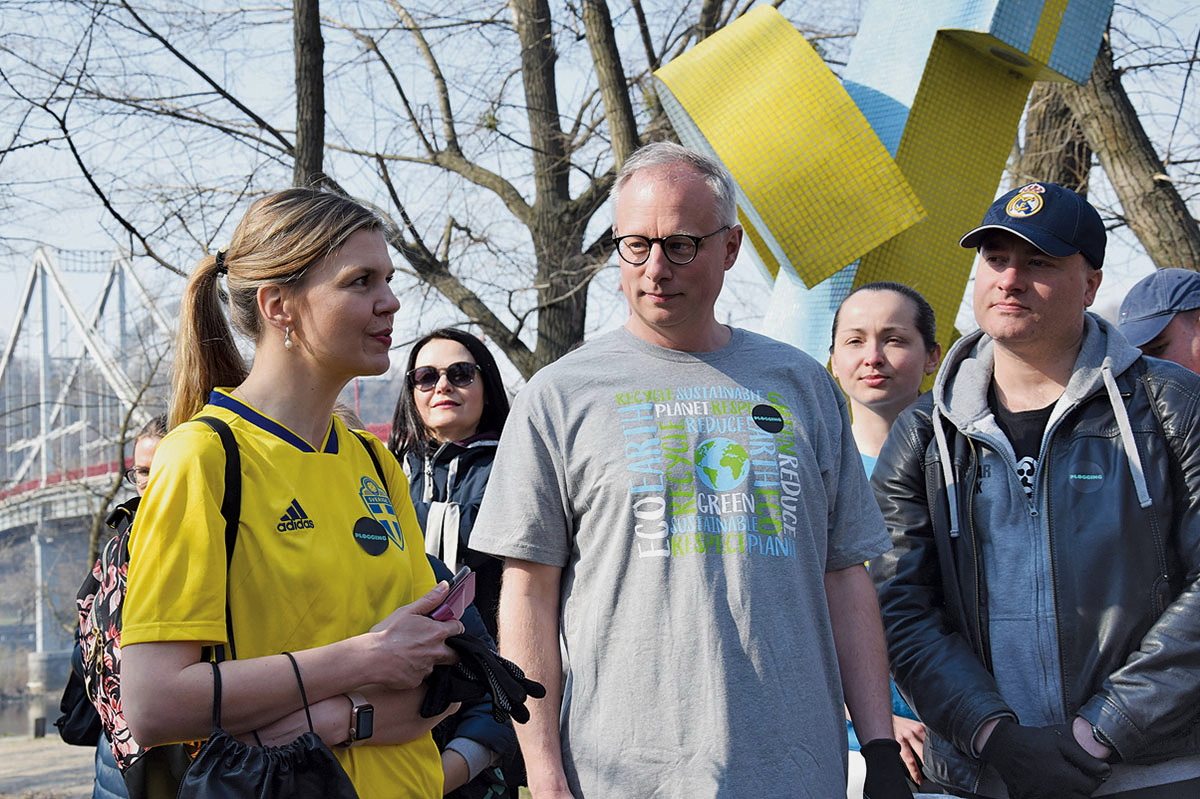Effective waste management, sustainable consumption of goods, recycling and reduction of plastic pollution has made Sweden one of the most sustainable countries in the world.
And now, this Nordic country of nearly 10 million people, provides Ukraine with a great example to follow and supports the local environmental movements.
To raise awareness about climate change and to assist Ukraine`s public organizations that operate in the field of environment and energy efficiency, the Kyiv-based Embassy of Sweden has allocated over $7 million in 2018 in helping Ukraine to become more environmentally-friendly.
Apart from the monetary assistance, the embassy brings publicity to the problem of climate change in Ukraine, arranging events where people learn more about recycling and upcycling, as well as talk about the importance of sustainable consumption of goods.
“It is important for the whole world as the climate does not have any country borders,” says Linn Härfast, the head of a section of economic and cultural affairs at the Embassy of Sweden in Ukraine.
Härfast, who lives in Kyiv since 2017, says there is a need to keep on sharing the Swedish experience with Ukrainians.
“This (climate change) is the biggest issue of our time, and we can make a change for the future,” says Härfast.
“If we do not start to behave differently, the planet would be not livable in the near future,” she adds.
Attracting publicity
Sweden`s reputation as one of the most sustainable country began in 1972 when it hosted the first United Nation`s conference on the environment that has led to the creation of the United Nations Environment Programme — the current top global environmental authority.
In 2014, the Embassy of Sweden launched a program to help Ukraine in meeting European and international environmental, climate and energy standards, providing Ukraine with investment grants, technical assistance and supporting public organizations. The program will operate until 2020.
“Sweden has good knowledge, advantage, and expertise, and that is why we focus on (environmet),” Härfast says.
And in March 2019 Sweden has once again proved to the whole world that it really cares about the environment — over a million students all over the world joined the school strike for climate, initiated by 16-years-old Swedish student Greta Thunberg.
“We believe that we have the experience that can be shared with Ukraine,” says Maria Lypiatska, the embassy’s communications officer.
Ukraine has also followed the Swedish example, and on March 15, nearly 50 activists gathered in Kyiv to raise awareness about climate change and its effects on the planet, demanding the government of Ukraine to implement active climate policy.
Even though Ukraine still has no effective waste management, Härfast says she can see some positive changes.
“There are so many initiatives going on in Ukraine regarding this (recycling), like No Waste Ukraine for instance,” Härfast says.
“I think this will make people recycle much more, and the trend will take off in Ukraine as well,” she says.
That is why the Swedish embassy, together with the Kyiv-based charity shop Laska, launched a “Nordic Night Swap” event, at the Kyiv History Museum on April 13, where people could bring their old clothes to be exchanged for some new items.
According to Lypiatska, they aimed to show people what sustainable consumption is, as well as to encourage them to buy fewer clothes and emphasized how the fashion industry pollutes the environment.
“The idea of upcycling and recycling is highly popular in Swedish society, so we also wanted to draw attention to this in Ukraine,” Lypiatska says.
With the help of Kyiv`s organization No Waste Ukraine, and the project “Batareiky, Zdavaitesia” (meaning “Batteries, give up” in Ukrainian) the embassy also installed some waste sorting boxes in its office in March, urging its employees to recycle and sort litter.

Karolina Jozic (L), a counselor at the Embassy of Sweden in Ukraine, and Marcus Brand, Senior Advisor, Democratic Reform and Sustainable Development at UNDP Ukraine, attend a plogging event at Trukhaniv Island in Kyiv on April 6, 2019. (Viktoria Zhukova)
New trends
But it is not only about recycling and sustainability, as the embassy also brings some new trends and habits to the country, such as plogging — a combination of jogging and picking up litter.
Founded in Sweden in 2016, plogging has become popular worldwide only two years after, and on April 6 the embassy held its first plogging event at Kyiv`s Trukhaniv Island, gathering nearly 100 participants.
Lypiatska says they were surprised by the number of people who decided to attend the plogging event.
“People start to think about the impact their lives have on the environment, and in my opinion this is great,” Lypiatska said.
Kyiv-based Hanna Aheieva, who attended the event, says she heard about plogging prior to it but wanted to experience the “authentic Swedish way of plogging.”
However, according to Lypiatska, plogging in Sweden differs from the one in Ukraine, as the Nordic country is less polluted and the amount of litter on the streets is different as well.
“We have faced the problem that people were fosued on collecting litter, and not on the running, so at the end, they could no longer carry the heavy bags,” Lypiatska says.
She also says they managed to gather a “small truck full of litter,” and also sorted it with the help of No Waste Ukraine.
And even though Ukraine is only at the initial steps towards recycling and sustainable consumption of goods, Aheieva believes that even such small steps as plogging can help improve the situation.
“It is important for Ukrainians to learn how to clean up after themselves and how easy it is to pick up garbage while jogging, and, therefore, make the environment a little bit cleaner,” Aheieva says.
